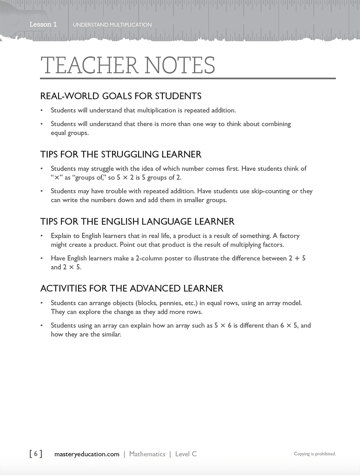Measuring Up to Georgia's K–12 Standards for Mathematics
Grades 3–8
Measuring Up to Georgia's K–12 Standards for Mathematics prepares students for the rigors of the assessment with lessons designed to improve academic growth and assessment results.
Standards-based instruction to meet the needs of Georgia students
- Supplement your curriculum.
- Intervention, before- or after-school programs, and summer school.
- Progress monitoring or benchmarking.
Georgia’s K–12 Standards-driven achievement
- Introduce concepts by connecting what students will learn to what they may already know.
- Use real-world examples.
- Provide key academic vocabulary in context.
- Scaffold learning with guided instruction, questions, hints, and checklists at point of learning.
- Apply learning independently with questions that emulate the Georgia Milestone Assessments.
- Measure mastery with Exit Tickets.
- Motivate students to master the Georgia's K–12 Standards with checkpoints, hints, Turn and Talk, Think About It and other prompts.
Master the Standards Using Four-Part Lessons
Each lesson connects new learning to prior knowledge through real-world examples and the use of key vocabulary. Key terms are listed along with examples demonstrating their usage within the lesson.

Tips, hints, and checkpoints are provided to build understanding and support mastery. How Am I Doing? prompts serve as checkpoints and writing opportunities to reinforce understanding of key skills and standards.

Items are designed to reflect the structure of high-stakes assessments, with starred questions identifying those that target critical-thinking skills. Work Space sections provide dedicated areas to show math work and take notes.

Questions provide an opportunity for students to verify their understanding of the skills and standards before progressing to the next lesson. A Practice Test at the end of each unit offers additional practice opportunities.

Student Edition

Standards-based literacy instruction features:
- Foundational and word knowledge skills to academic vocabulary building.
- Language conventions and writing composition.
- Informational text and literature of varying text types, genres, and complexity.
- Integration of knowledge and ideas.
- Building knowledge drawing upon previously read or known information.
Teacher Edition
The robust teacher editions include:
- Instruction to incorporate the real-world lesson goal.
- Differentiation for struggling, advanced, and English Language Learners.
- Lessons feature tips and activities for diverse learners, including striving, advanced, and ELLs.
- Scoring rubrics, checklists, and graphic organizers.
- Guidance for interpreting and using data.
- Standards information and support.




